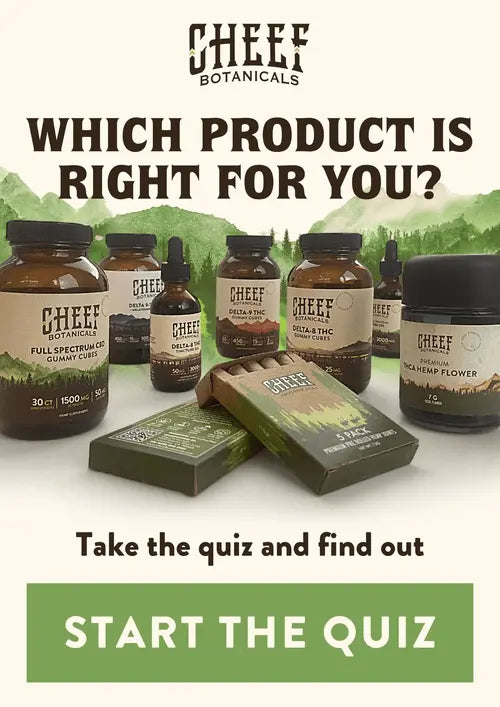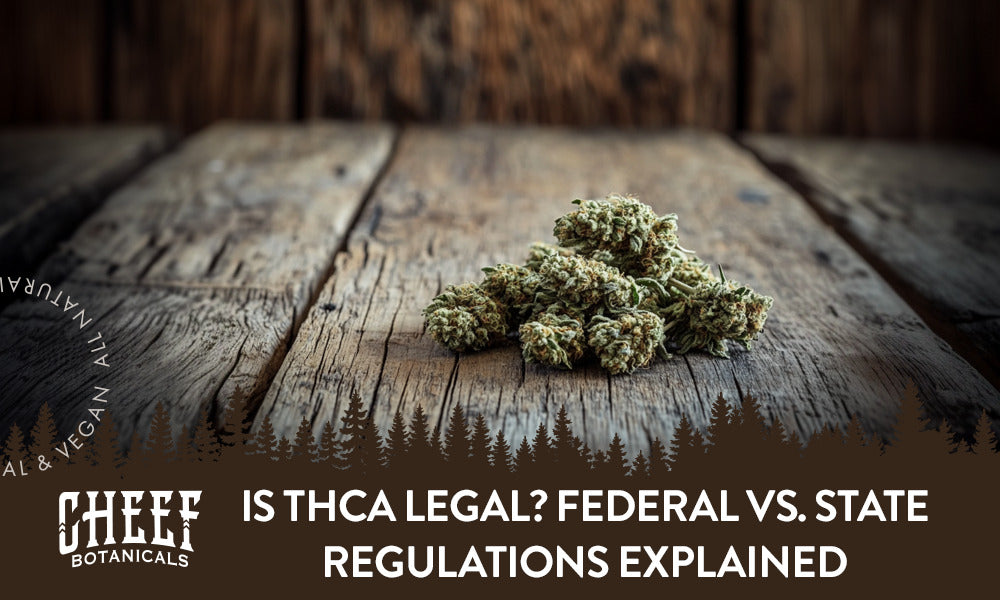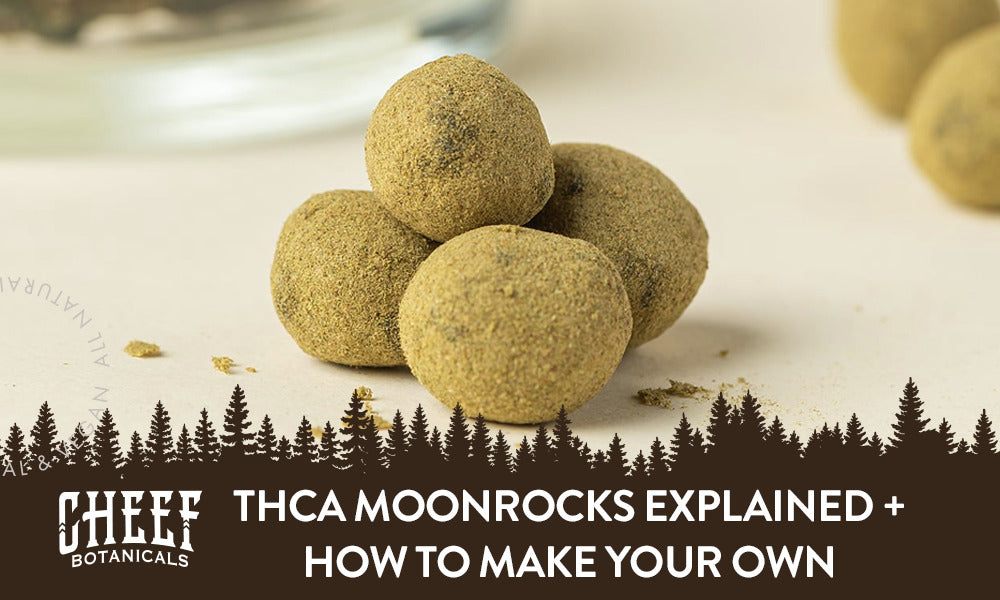Ever wondered what's really happening when you fire up your dab rig, flower, or vape? Here's the big question: does THCa turn into Delta 9 when smoked? The short answer is yes, but how it happens is what makes cannabis so fascinating.
When heat hits raw cannabis, THCa undergoes a chemical reaction that transforms it into Delta 9 THC, the compound responsible for those euphoric effects. But there's more to it than just heat. This process, called decarboxylation, is a key part of how cannabinoids work to deliver their effects.
Curious to know what's going on behind the scenes? Keep reading to learn how this conversion works and why it's essential for cannabis enthusiasts to understand.
Understanding THCa and Delta 9 THC
To answer how THCa turns into Delta 9 THC when smoked, it's important to understand what these compounds are and how they differ. Both are cannabinoids found in the cannabis plant, but they serve distinct roles. Let's explore their unique characteristics before diving deeper into the process later.
What Is THCa?
THCa, or tetrahydrocannabinolic acid, is a non-psychoactive cannabinoid found in raw cannabis plants. Unlike Delta 9 THC, it doesn't produce elevated or euphoric effects. Instead, THCa remains mostly inactive until it's exposed to heat, making it a popular choice for those interested in consuming raw cannabis.
You'll find THCa in products like cannabis capsules, tinctures, and other edibles that don't require heat. It's popular because it stays in its original form and is known for its potential therapeutic properties. Many cannabis enthusiasts like it because it lets them enjoy the plant without the psychoactive effects.
What Is Delta 9 THC?
Delta 9 THC is the main psychoactive compound in cannabis. It's what most people think of when they hear about the blissful effects cannabis can bring. Unlike THCa, Delta 9 THC is already active and doesn't need heat to work its magic.
This compound is a big deal in cannabis products like carts, edibles, and flower. It's also the reason many cannabis consumers experience feelings like euphoria or elevated moods. While it's popular for its effects, some people are also drawn to its potential therapeutic benefits, making it a top choice in the cannabis world.
Key Differences Between THCa and Delta 9 THC
The biggest difference between THCa and Delta 9 THC is their psychoactive properties. THCa doesn't cause euphoric effects, while Delta 9 THC is responsible for the blissful "high" feeling many people associate with cannabis. This makes THCa a great option for raw cannabis use and Delta 9 THC ideal for those seeking a more elevated experience.
THCa is found in raw cannabis and stays non-psychoactive unless heated to certain temperatures. Delta 9 THC, on the other hand, forms after heat exposure and is the primary psychoactive component in most cannabis products. Their differences mean they cater to different needs, depending on what you're looking for in your cannabis consumption.
Cannabis enthusiasts often choose THCa for its non-psychoactive therapeutic benefits, while Delta 9 THC is the go-to for a more traditional cannabis experience. Knowing these differences can help you make more informed decisions about how to enjoy cannabis.

The Process of THCa Turning Into Delta 9 THC
When THCa is exposed to heat, it converts into Delta 9 THC, the compound responsible for cannabis' psychoactive effects. This change, called decarboxylation, is key to unlocking the full potential of cannabis.
The Role of Decarboxylation
Decarboxylation is the process that makes cannabis cannabinoids psychoactive. It happens when THCa, a non-psychoactive compound, is heated and converted into Delta 9 THC. Without this step, the cannabis plant would stay in its raw form and provide zero euphoric effects.
The reaction starts when heat removes the carboxyl group from the THCa molecule. This simple chemical shift turns it into Delta 9 THC, the compound that interacts with your cannabinoid receptors to produce potent effects. It's an important step in smoking cannabis or making edibles, ensuring the plant material reaches its full potential.
How Heat Converts THCa to Delta 9
Heat is the driving force behind the conversion of THCa into Delta 9 THC. When raw cannabis is exposed to temperatures between 220°F and 320°F, a chemical reaction begins. This reaction removes an element of the THCa molecule, known as the carboxyl group, which activates its psychoactive properties.
The temperature and exposure time are important for ensuring efficient conversion. Too little heat won't fully transform the THCa, while too much can degrade the beneficial compounds. This balance is why methods like smoking, vaping, or baking are preferred by cannabis enthusiasts for reliable results.
Why Smoking THCa Activates Delta 9 THC
Smoking is one of the fastest ways to activate Delta 9 THC from THCA because it provides instant heat. When you light a joint or use a dab rig, the temperature skyrockets, causing THCa to rapidly decarboxylate. This quick reaction produces Delta 9 THC almost immediately.
This method ensures complete conversion of THCa, maximizing the psychoactive properties of the plant. Smoking cannabis also avoids the slower processes of other methods, like baking, making it ideal for consumers looking for fast results. It's why cannabis smoke remains a top choice for many seeking an elevated experience.
What Happens When You Smoke THCa?
Smoking THCa triggers a quick transformation. The heat converts THCa, a non-psychoactive cannabinoid, into Delta 9 THC, the main psychoactive component of cannabis. This process changes the way your body reacts to the plant, giving you a buzz along with therapeutic benefits.
Effects of Decarboxylated Delta 9 THC
Once THCa becomes Delta 9 THC, the psychoactive properties kick in. This creates feelings like elevated mood, heightened sensory perception, and pure comfort. Delta 9 THC connects with your brain's cannabinoid receptors, which is why the effects happen so quickly after smoking cannabis.
These effects depend on factors like the amount of THCa converted and the consumption method used. Smoking cannabis ensures a rapid conversion process, which is why it's a favorite for people seeking immediate effects. This quick reaction highlights the importance of how THCa and Delta 9 THC interact with heat.
Potency Levels of Smoked THCa
When you smoke THCa, about 87.7% of it can convert into Delta 9 THC—nearly a 90% return rate. This is known as the optimal conversion efficiency, but reaching it isn't always guaranteed. Factors like heat levels, smoking techniques, and the condition of the plant material can all affect the results.
While not every session achieves the optimal rate, smoking THCa still delivers strong potency for the most part. The fast conversion process is what makes this method popular among cannabis enthusiasts looking for an effective experience.
Does THCa Always Turn Fully Into Delta 9?
While THCa does convert into Delta 9 THC when exposed to heat, it doesn't always achieve full conversion. Factors like temperature, smoking techniques, and the quality of the plant material can influence how efficiently THCa transforms into Delta 9 THC. Understanding these variables is key for cannabis enthusiasts who want to maximize the psychoactive effects or therapeutic benefits of their cannabis products.
Factors That Affect Conversion Efficiency
Several factors can impact how much THCa successfully turns into Delta 9 THC. While heat is the main driver, other elements also come into play, affecting the conversion process and the final cannabis experience.
- Temperature Control. Maintaining the optimal temperature range is crucial. Too much heat can degrade beneficial compounds, while too little heat might not fully activate the THCa.
- Smoking Method. Different consumption methods, like vaping, dabbing, or traditional smoking, influence how efficiently THCa converts. Instant heat from dabbing may yield better results compared to slower methods like cooking.
- Plant Material Quality. The moisture content and molecular structure of the raw cannabis affect how well the THCa molecule reacts to heat. Fresher, high-quality raw cannabis tends to convert more efficiently.
- Heat Exposure Time. Prolonged or uneven heating can lead to incomplete conversion, leaving behind some valuable cannabinoids.
The Role of Temperature in Smoking THCa
Temperature is a big deal when it comes to smoking cannabis and converting THCa into Delta 9 THC. For the best results, the heat needs to stay within the optimal temperature range of 220°F to 320°F. If the temperature goes too high, it can destroy beneficial compounds and reduce their potency.
The key is striking a balance between heat and time. Too low, and the chemical reaction won't fully activate the THCa molecules. Too high, and you risk degrading the THC and other cannabis compounds. Using precise methods, like vaping or dabbing, can help achieve a more efficient conversion and a better overall cannabis experience.
Cheef Botanicals' Smokable THCa Options
Cheef Botanicals offers premium smokable THCa products for every preference. Whether you love flower, pre-rolls, vapes, or concentrates, we've got something special for you.
- THCa Flower: Our THCa flower includes top strains like Gelato (Hybrid), Han Solo (Indica), Sex Panther (Sativa), and Pineapple (Hybrid). Each strain offers unique flavors and effects, from uplifting energy to relaxing calmness. Lab-tested for purity and safety, our flower ensures a premium cannabis experience.
- THCa Pre-Rolls: Enjoy the convenience of pre-rolls in strains like Runtz (Hybrid), Gelato (Hybrid), Han Solo (Indica), and Sex Panther (Sativa). These pre-rolls deliver smooth, consistent effects with no rolling required. Perfect for on-the-go or quick sessions, they're an easy way to enjoy THCa.
- THCa Vapes (Carts and Disposables): Our vapes feature strains like Blue Dream, Berry Gelato, Durban Poison, and Lemon Cherry Gelato. The heat from vaping activates the THCa, delivering full effects and bold flavors. Choose disposables for convenience or carts to pair with your favorite battery.
- THCa Concentrates: Our THCa concentrates include live resin diamonds and live rosin, each crafted for maximum potency and flavor. Live resin diamonds feature over 80% THCa content, offering intense effects and bold flavors like the dynamic Spritzer strain. For a cleaner, solventless option, our live rosin preserves the plant's natural terpenes, delivering a smooth experience. Try the Lemon Cherry Gelato strain for its sweet cherry and citrusy lemon profile, unlocking full effects with heat.
How Does Smoking THCa Compare to Eating Raw THCa?
Smoking and eating THCa work in totally different ways. When you smoke, the heat converts THCa into Delta 9 THC, creating psychoactive effects like euphoria and relaxation. Eating raw cannabis keeps the THCa in its non-psychoactive form, offering potential therapeutic benefits without producing a high.
Smoking works fast and gives immediate effects while eating raw provides slower, more natural support. The choice depends on whether you're looking for quick results or more subtle wellness benefits.
How Does Smoking THCa Compare to Topical THCa Applications?
Smoking THCa and using topicals are two very different experiences. Topicals are cannabis-infused creams, balms, or oils that are applied directly to the skin. Unlike smoking, topicals don't involve heat, so THCa stays in its non-psychoactive form, focusing on localized potential benefits without creating a high.
Smoking activates THCa into Delta 9 THC, delivering fast, full-body psychoactive effects. Meanwhile, topicals target specific areas, offering relief to the skin, muscles, or joints without affecting the rest of your body. If you're looking for quick, noticeable effects, smoking is the way to go. For targeted, external benefits, topicals are a great option.
Is Smoking THCa Legal?
Smoking THCa is federally legal as long as it's derived from hemp and contains less than 0.3% Delta 9 THC. However, state laws can differ, with some placing restrictions on THCa products. Understanding both federal and local regulations is important before purchasing or using THCa.
Federal vs. State Regulations on THCa
Under federal law, THCa is legal if it comes from hemp containing less than 0.3% Delta 9 THC, thanks to the 2018 Farm Bill. However, some states have stricter laws and may classify THCa as a psychoactive compound, notably because it can convert into Delta 9 THC when smoked. This creates a gray area, making it essential to check local cannabis regulations before purchasing or using THCa products.
States with more progressive cannabis laws are often more lenient about THCa, while others may restrict its sale, possession, or use. The cannabis industry continues to push for clearer guidelines, but for now, legality can vary greatly depending on where you live. Staying informed about your state's stance helps ensure compliant and responsible cannabis use.
Are There Age Restrictions for Smoking THCa?
Yes, there are age restrictions for smoking THCa, just like with other smokable products. In most states, you need to be at least 21 years old to purchase or consume THCa. This aligns with regulations for smoking cannabis or using other cannabis products, ensuring responsible use among adults.
Retailers often require proof of age before selling THCa flower, pre-rolls, or vapes. These restrictions are in place to prevent underage access and promote responsible cannabis consumption. Always check local laws, as some states may have stricter requirements for purchasing or smoking THCa.

Benefits of Smoking THCa
Smoking THCa offers several advantages, making it a popular choice for cannabis enthusiasts. From fast-acting effects to discreet consumption, this method provides a unique cannabis experience. Let's explore some key benefits and how smoking THCa can enhance your cannabis use.
Fast-Acting Effects Compared to Other Methods
When you smoke THCa, the effects kick in almost immediately. The heat triggers the process called decarboxylation, turning THCa into Delta 9 THC, which is quickly absorbed into your bloodstream. This rapid conversion process makes smoking one of the fastest ways to feel the psychoactive effects. For people who want quick results, it's hard to beat the speed of smoking cannabis.
Convenient Consumption
Smoking THCa is one of the easiest and most convenient ways to enjoy cannabis. Pre-rolls, THCa flower, and vape carts are portable and simple to use, making them great for on-the-go. Unlike other methods, smoking requires no preparation and provides instant effects. If you're looking for something quick and hassle-free, smoking THCa is an excellent option.
Potential Therapeutic Benefits
Smoking THCa may offer potential therapeutic benefits for those seeking quick relief. Once converted into Delta 9 THC, it interacts with cannabinoid receptors, potentially promoting relaxation and supporting overall well-being along with an enjoyable buzz. Many users appreciate how fast smoking works compared to slower alternative methods like edibles. For those looking for efficient results, smoking can be a great choice for their cannabis experience.
Final Thoughts - Does Smoking THCa Turn It Into Delta 9 THC?
Yes, smoking THCa does convert it into Delta 9 THC through the process called decarboxylation. Heat triggers this chemical reaction, turning THCa into the primary psychoactive component that delivers cannabis' psychoactive effects. This is why smoking is one of the fastest ways to feel the effects compared to other consumption methods.
Smoking THCa is simple and effective, making it a favorite among cannabis enthusiasts. It offers both potential therapeutic benefits and quick results, making it a great option for those who value convenience. Whether you enjoy THCa flower, pre-rolls, or vapes, this method delivers a unique and satisfying cannabis experience.
By understanding how heat activates THCa, you can make informed choices about your cannabis consumption. Smoking THCa is a reliable way to unlock its full psychoactive properties, giving you both speed and potency in one easy step.


![Does THCa Turn Into Delta 9 When Smoked? [Read Before Lighting Up]](http://cheefbotanicals.com/cdn/shop/articles/Does-TCa-turn-into-Delta-9_b9625dd0-72e6-4568-9a7a-91b64336ba26.jpg?v=1747178527&width=1500)
 Watermelon OG - Top Seller
Watermelon OG - Top Seller
 Runtz THCa Flower - Excellent Choice
Runtz THCa Flower - Excellent Choice
 Han Solo THCa Flower - Highly Rated
Han Solo THCa Flower - Highly Rated
 Space Junkie THCa Flower - Good Value
Space Junkie THCa Flower - Good Value



Leave a comment
This site is protected by hCaptcha and the hCaptcha Privacy Policy and Terms of Service apply.